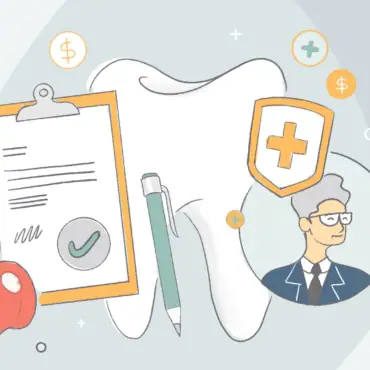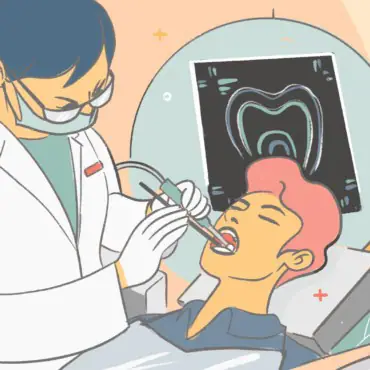For the average person, a trip to the dentist can be a source of anxiety. A 2018 study found that roughly 60 percent of people suffered from “dental fear.” The dental patient experience is key to making patients feel comfortable in your chair.
Today, potential dental patients have their pick of dentists and the ability to research practices right from their smart devices. Competition is heavier than ever which means differentiation is one of the most effective ways to stand out. If you know how many people are nervous about going to the dentist, this can be the perfect insight to help you differentiate your practice.
This article provides numerous ways to upgrade a dental practice’s experience for patients from start to finish: from having an easy booking process, to ensuring anxiety-free waits, to smooth appointments, to appropriate follow-ups. Join us as we show how to create offices patients will look forward to visiting and help alleviate the fear of appointments.
Leading Up to the Appointment
A dental patient’s experience with your dentist office starts long before they visit. Here are four tasks to complete ahead of your patient’s appointment.
Keep your website user-friendly
A 2018 survey of 351 small businesses found that roughly 64 percent offered a website. Dentists are more likely to have a website, with 78 percent in one study reporting they had a site for their practice (of that number, about 85 percent said they were happy with their websites).
Dental websites can help with customer discovery, appointment booking, as well as providing valuable pricing and service information. Because of the many ways a website can help your practice, it’s vital to maintain user-friendly websites by following steps such as:
- Making sure it has an online scheduling tool
- Ensuring it’s mobile-friendly
- Roughly 60 percent of respondents stated their websites are mobile-friendly in the aforementioned small business survey
- Incorporating a variety of content, such as embedded YouTube videos
- Have an engaging and professional website layout
- With various template websites available, such as Wix, it’s relatively easy for dentists to have engaging websites for their practices.
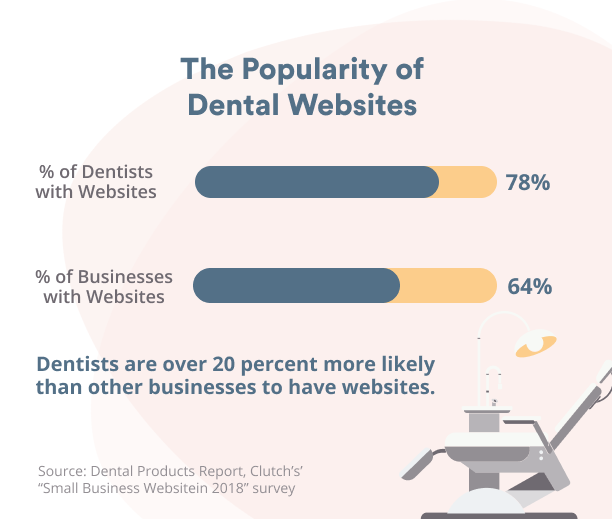
Regularly incorporate new technology
Many dentists keep regular tabs on the latest dental technologies to improve their practices and operations. One of these dentists, Dr. Neal Patel in his article on patient experience and techonlogy, lists cone beam computed tomography (CBCT), computer-aided design (CAD), computer-aided manufacturing (CAM) as some of the new technology he believed could improve levels of patient care.
Bien Air’s IChiropro, for example, is “an implant motor that uses an iPad to control a pre-programmed clinical sequence for implantology.”
With the speed at which innovation moves these days, dentists need to incorporate new technologies into their practices to keep up. If these technologies help you improve your level of care, it’s worth looking into.
Keep proven methods, like postcard reminders
Well-designed websites and the latest technology are important parts of managing a dental practice. That said, good old fashioned postcards are still needed as well, to reach dental patients who might not be as computer-savvy or simply prefer an appointment reminder they can affix to their refrigerator or cubicle.
A couple of tips for the postcards include:
- Make the greeting fun and personable
- Include the dental patient’s name, perhaps handwritten
- Make the timing customizable
- Let patients decide how often they want to receive the postcards
Refresh your waiting room
Dental offices can sit trapped in time, with decades-old copies of Highlights for Children and framed advertisements with 1990s sitcom stars imploring people how often to floss and brush. Don’t let this be your practice.
Let your dental patients know you care about their experience by creating a 21st-century waiting room aesthetic. This can mean clean, modern design and flat-screen TVs, or recent reading materials. Not sure where to start? Google some examples then get opinions from your team and keep your goals in mind. Comfort, cleanliness, a welcoming atmosphere for many, or modernity are all great style goals.
In the Waiting Room
A patient’s dental appointment begins in the waiting room. Here are a few ways to ease tensions for your patient as they wait to see you.
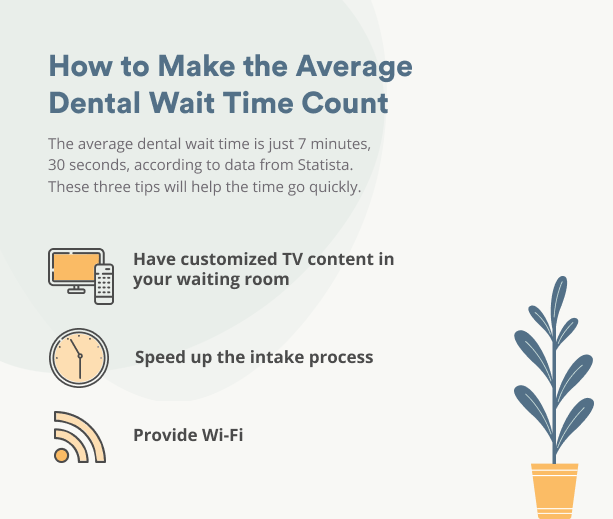
Create a relaxing space
Aside from updating your waiting room, those trying to figure out how to increase dental patient volume in a dentist office should focus on fostering relaxing waiting room environments. Ways to do this include:
- Play calm music at moderate volumes
- Train your staff to maintain a calm and professional demeanor at all times
- Avoid having too much magazine clutter. Clear out materials that are more than a couple of months old and keep stacks manageable and tidy
Customize your TV content
It’s easier than ever for businesses to customize the content on their waiting room televisions by making the most of the frames, sidebars, and bottom of the screen tickers.
Worry-free insurance verification
Opencare takes the guesswork and effort out of insurance verification.
Customizable TV content can give dental patients entertainment through licensed rebroadcasts of popular shows as they wait to be seen for their appointments. The content can also help raise brand awareness, both for the dental office and third-party sponsors who might have display ads.
This said, strike a careful balance. Aside from showing no commercials, dentists incorporating customized TV content into their waiting rooms will want to be careful not to overdo it with banner and sidebar ads. Less is more, too much visual clutter can spike anxiety in dental patient experience before the appointment.
Offer streaming-capable WiFi
Plenty of dental patients still prefer to entertain themselves, or some may want to keep small children occupied, or need to complete some work while they wait. Add an extra element of convenience and comfort by offering complimentary, and reliable WiFi to allow patients to watch their favorite shows on their smartphones as they wait for their appointment.
Manage wait times
So much of service-based business is about setting clear expectations for customers and then delivering. Your front desk staff needs to manage wait times for dental patients as they sit in the lobby of your office.
Here are a few ways to manage wait times:
- Set accurate expectations
- If the wait is 45 minutes, be honest and accurate. Customers can generally handle longer wait times as long as they’re prepared.
- Make the time feel quicker
- This can include providing entertainment options and training staff to engage with waiting patients, when appropriate
- Speed up the intake process
- Look for how to improve dental schedule practices, from automating appointment paperwork ahead of time to staggering scheduled cleanings, keeping patients from waiting for long periods
During the Appointment
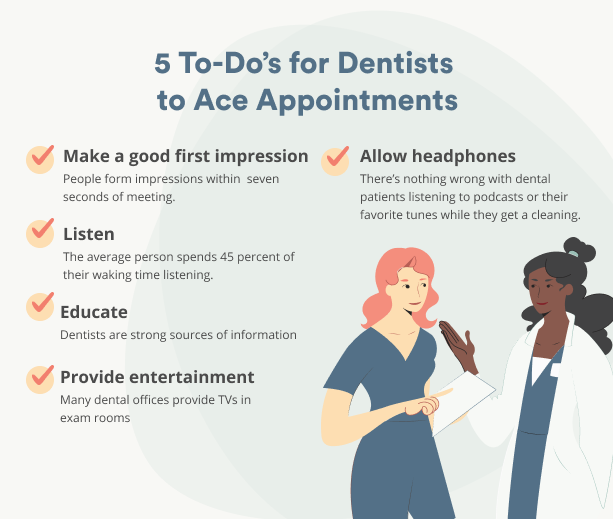
Once a patient’s appointment begins, it’s time for dentists and dental hygienists to shine. Here are a few tips to make sure the patient’s time in the chair goes smoothly.
First impressions matter
Research suggests that people form first impressions about others within seven seconds of meeting. Therefore, it’s extremely important for dentists to make good first impressions and set the tone for how appointments will go.
One way to do this is by greeting every patient directly and guiding them to the exam room. Too often, dentists can hide behind counter staff and hygienists and function as mysterious, intimidating figures. Put patients at ease from the minute you greet them and let them know a reliable, relaxing appointment awaits.
Listen to get a sense of expectations
Listening is the most-used communication skill, with humans spending approximately 45 percent of their waking hours listening. For dentists, listening acutely well to patients at the beginning of appointments can help provide a window into patient expectations.
Does the patient know they have a lot of tartar that needs to be removed from their teeth? Are they hoping a cleaning will result in a slightly whiter smile? Have they been experiencing any mouth pain they want to be examined? Do they sound nervous or uncomfortable?
Worry-free insurance verification
Opencare takes the guesswork and effort out of insurance verification.
Listening to patients can help give dentists the information they need to provide the best possible service. It can also help ease anxiety for patients, making them feel heard.
Educate the patient
After listening to the patient, lay out what the appointment will entail and consider their questions or concerns. If their journey to stronger dental habits were a lesson, you are the teacher. Think of the best teachers you’ve ever had and how they helped you learn. Encourage questions and check to see if what you’re saying is being understood.
The goal is to not just help the patient get through their current appointment but have greater oral health long-term with the dental patient experience. It’s comforting and empowering for patients to know that better dental health is well within their reach, with the help of the lessons a good dentist can impart.
Have entertainment options
With all this talk of first impressions and teachable moments, it’s worth noting that a dental appointment doesn’t have to be strictly business. Dentists can also provide appointment entertainment, be it through music or even flat-screen televisions positioned strategically near or even directly above dental chairs.
After all, anything beats staring at the ceiling or dental lamp. These can help improve the dental patient experience.
Welcome patients to use headphones
Many patients can also be counted on these days to provide their own entertainment through downloaded music or podcasts on their smartphones.
In other words, headphones can be fine to wear during a cleaning, provided they don’t get in the way of dental equipment or prevent a dentist from communicating with their patients. Let patients know once you’ve chatted, they’re welcome to put on their headphones.
After the Appointment
Once a patient’s appointment is complete, there are a few final steps to take to wrap up smoothly and help ensure the patient returns for future appointments.
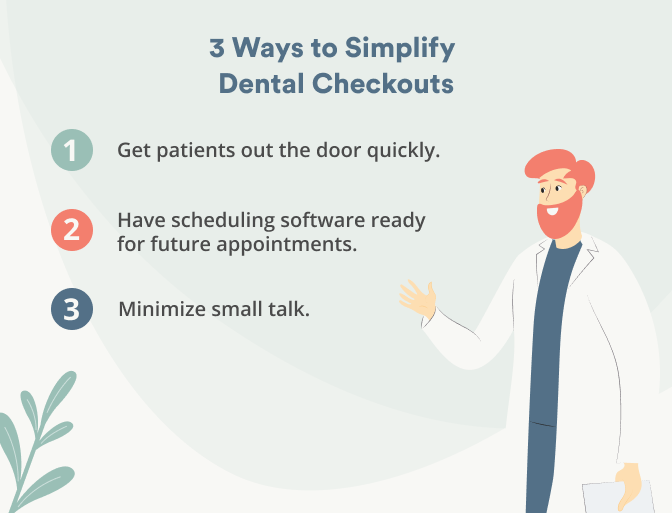
Simplify checkout
Whether dental patients are relieved to get up out of the chair or pleased by that “fresh from the dentist clean” feel, they’re probably ready to leave the office.
Having a streamlined checkout process in the dental patient experience can get patients swiftly out the door, ensuring that they’re able to get on with their day and maximizing efficiency for your staff. Ways to simplify checkouts include having scheduling programs ready to go for future appointments and minimizing small talk.
Survey dental patients
Sometimes, the smiles or kind words at the end of dental appointments might not tell the whole story. Regularly surveying patients can help find issues that should be dealt with promptly. Like an abscessed tooth, a dental customer service problem shouldn’t be left to fester.
Collect 99% of your claims
We settle your claims, so you don’t settle for less.
There are many ways to survey patients. Websites like SurveyMonkey and Qualtrics provide survey tools for businesses, but sometimes at a cost. Companies on a budget can also access free survey tools through Google Drive.
Send tips for dental care between appointments
As mentioned earlier, learning good dental care can be a long-term process for patients, with many people having to learn over time how to brush and floss more regularly and other strategies for maintaining oral health.
With the Internet, there’s no reason learning opportunities must be confined to the dentist’s office. Show your expertise and eagerness to help by regularly sends tips to their patients, via newsletter sites such as Constant Contact. This helps patients grow, lessens their chances for cavities and dental decay between appointments, and also provides powerful engagement and marketing for dental practices.
5 Tips to Keep Improving the Dental Patient Experience
For anyone still seeking ways to improve the dental patient experience, here are five more tips:
- Take nothing personally: Some people, no matter what, won’t enjoy a trip to the dentist.
- Focus on incremental improvements for difficult patients: After all, these people won’t have their problems solved overnight.
- Market key areas of your practice that you excel in: A person needing a root canal might be put at ease if they know your office does this better than any other in the region.
- Don’t make payment a source of anxiety: Working with a variety of insurers if possible, accepting credit, and being open to payment plans are a few ways to prevent stress with patients go to pay.
- Always be honest with patients: Dentists sometimes get a bad reputation, with some unethical practitioners even known to do unnecessary work. Needless to say, a reputation for honesty is invaluable for dentists. Explain why a filling needs replacing, or why x-rays need to be retaken. If you’re putting your patient’s health first, that honesty will instill confidence and trust.
Beyond this, the best advice perhaps for any dentist is to continue learning and growing. Improving dental patient experiences is a constant effort, with no exact solutions that fit all practices. What works today might not be so effective tomorrow. Or what works for a dental office in another location may not work for your patients. So give it time and don’t give up!
Collect 99% of your claims
We settle your claims, so you don’t settle for less.


